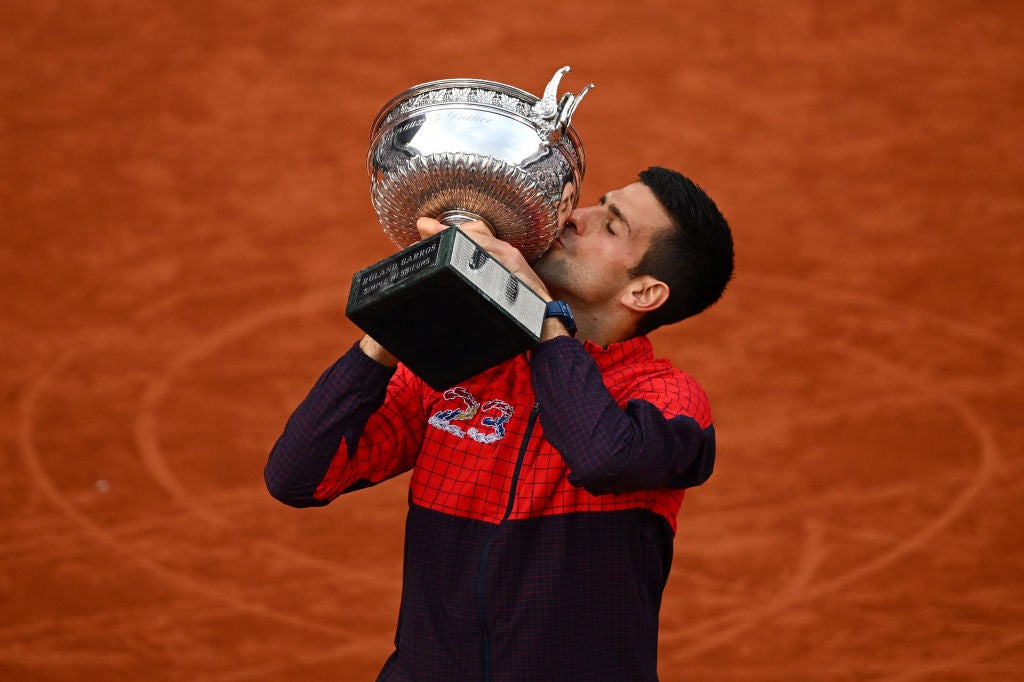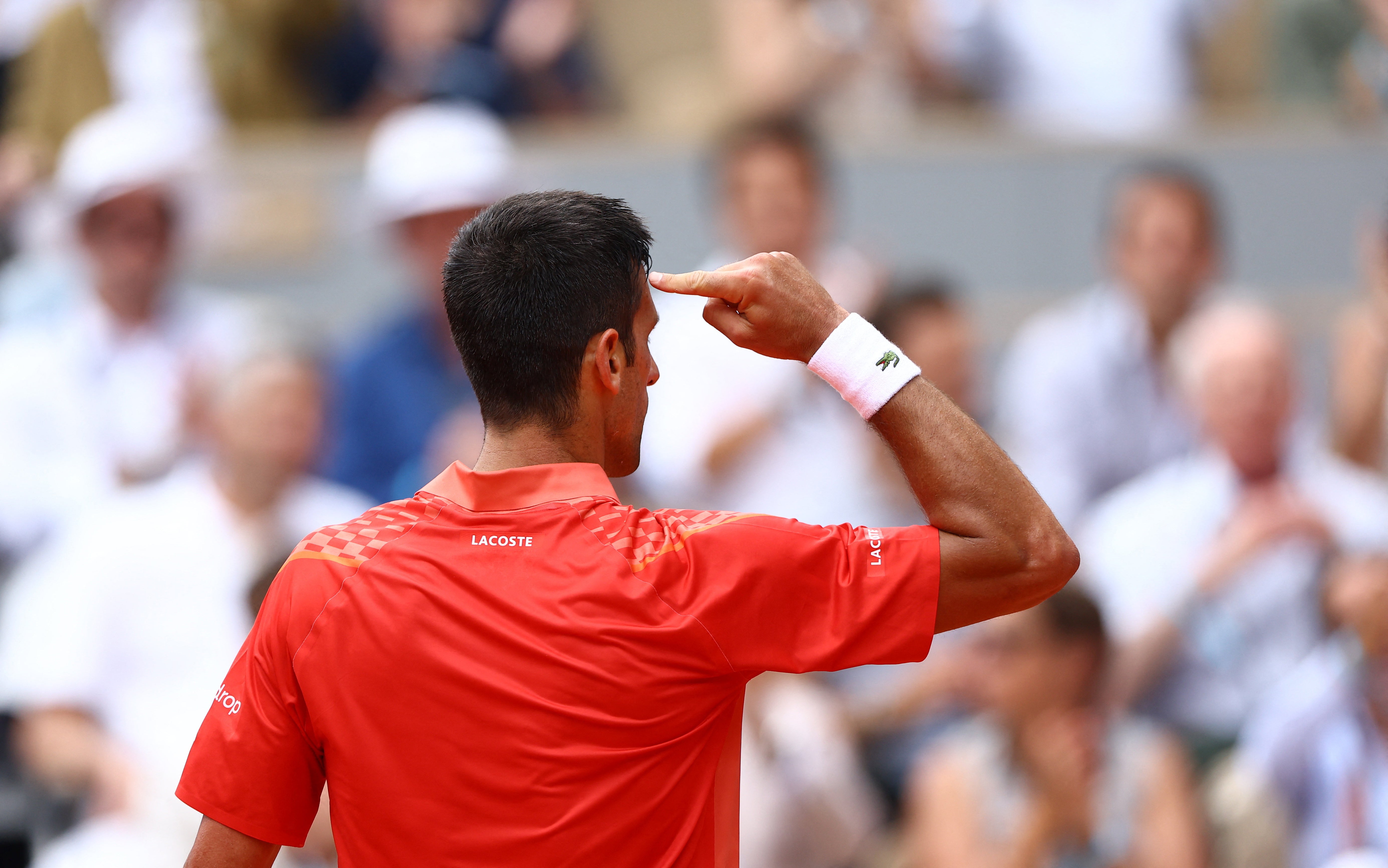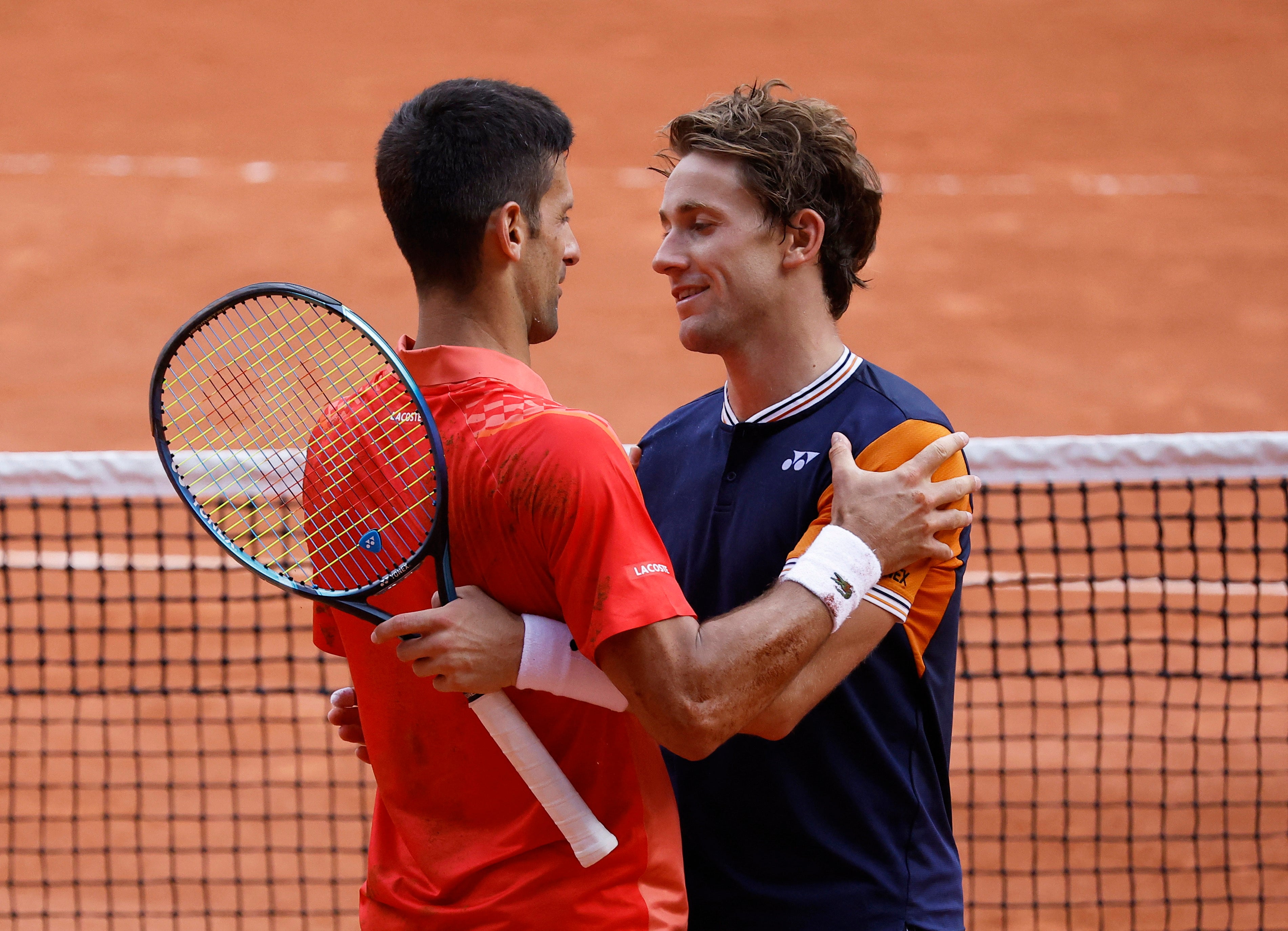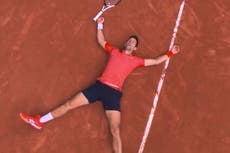The scary truth behind Novak Djokovic’s historic French Open victory
Djokovic defeated Casper Ruud 7-6 6-3 7-5 to win a record-breaking grand slam title on the Paris clay, but he is not done with 23 - far from it
Novak Djokovic has spent most of his life playing catch up to Rafael Nadal and Roger Federer. Only now, at 36, has he finally reached the summit to stand alone at the top.
With his victory in the French Open final, the Serbian has claimed a men’s record 23rd grand slam title, moving ahead of his great rival Nadal on the most successful court of the Spaniard’s career. Djokovic defeated Casper Ruud 7-6 6-3 7-5 on the clay of Roland Garros to claim his third French Open crown, also becoming the first man to win each of the four grand slams at least three times. Djokovic is now level with Serena Williams with 23 grand slams, while Margaret Court’s overall record of 24 is the next target.
But with history on the line, Djokovic produced a performance that showed why he is likely to finish his career with a far higher total, and as the most successful player of all time. Against Ruud, Djokovic saved his best level for the biggest moments of the match and was faultless in the crucial first-set tiebreak. Ruud, the 24-year-old Norwegian, battled courageously but Djokovic served immaculately and offered up no opportunities in the second and third sets.
When Djokovic approached the finish line at the end of the third set, he found another gear, winning 12 of the last 13 points while hitting a series of unstoppable forehand shots. Djokovic won the third set with 22 winners to just seven unforced errors. Other players may have felt the pressure but Djokovic, as he so often does, thrived on it. This was another victory built on his supreme mental fortitude.

As he has grown older, Djokovic has not shied away from admitting that he is driven by records and his desire to finish with the most grand slams in history. After winning the Australian Open and French Open this season, Djokovic is also halfway to completing the calendar grand slam - a feat the Serbian was one win away from completing before his defeat to Daniil Medvedev in the 2021 US Open final. Rod Laver remains the last men’s player to complete the grand slam more than 50 years ago.
Like his record-equalling title at the Australian Open at the start of the year, Djokovic was pushed emotionally and physically at Roland Garros. He stirred up fresh controversy at the start of the tournament after writing “Kosovo is the heart of Serbia” on the camera after his first-round victory, a message that risked inflaming political tensions in the region. “Drama-free grand slam, I don’t think it can happen for me,” Djokovic said.
But with his victory in the final against Ruud, Djokovic’s aura continued to deny the next generation on the biggest stage. Even at 36, beating Djokovic in a best-of-five-sets match at a grand slam remains one of the toughest tests in sport and is a challenge that only Nadal and Medvedev have managed to overcome in the past three years. Djokovic has now won 11 of his last 13 grand slam finals since turning 30; Ruud, the runner-up to Nadal last year, is without a victory in his first three.
But the Norwegian threw everything he could at Djokovic in an epic 81-minute first set and took a much more aggressive approach than in last year’s final defeat to Nadal, putting his more experienced opponent under pressure behind his heavy forehand. As Djokovic was forced into uncharacteristic errors and Ruud controlled the longer rallies, the Serbian trailed 4-2 but broke back to force the first-set tiebreak. Djokovic found an extra gear and his game increased to its highest level. For the sixth tiebreak in a row at this year’s French Open, Djokovic did not commit a single unforced error as he crushed Ruud 7-1 in the decider.


It set an ominous tone for the rest of the match: Djokovic broke Ruud immediately with another huge effort at the start of the second, sucking the life out of the match and his opponent. Once ahead, Djokovic offered up no opportunities on his serve to close out the set in almost half the time of the first. At the end of the third, with Ruud threatening to force a tiebreak, Djokovic won eight points in a row to hold serve and then break his opponent, reaching an unplayable level.
Despite his recent dominance over the sport, Djokovic had never led the men’s grand slam race until now. Federer had already won 12 major titles when Djokovic, aged 20, won his first at the Australian Open in 2008. Federer went on to reach 20 with his historic victory in Melbourne ten years later in 2018, aged 36. Both Nadal and Djokovic briefly joined the Swiss on 20 titles when the Serbian won his sixth Wimbledon in 2021, before Nadal struck ahead with his own improbable Australian Open triumph in 2022.
Nadal made it to 22 with his victory at last year’s French Open but Djokovic has now won three out of the past four grand slams to move ahead in the race for the first time. It is also likely to be the last time the record changes hands. With Federer retiring from the sport last September and Nadal out until next January ahead of his swansong year in 2024, Djokovic now has the chance to put clear distance between himself and his two great rivals. The Serbian will bid to match Federer’s Wimbledon record by winning an eighth championship at the All England Club next month, where Djokovic has won the last four men’s singles titles.
Winning at Roland Garros, where Nadal has 14 titles, carried extra significance. “It’s not a coincidence that I’ve won my 23rd here in Paris,” he said. “This tournament’s always been the hardest for me to win, so I’m very emotional right now. It means a lot to me.” Now he stands alone, the question turns to how far ahead Djokovic can get. And the scariest truth for everyone else is that the most successful male player of all time is looking better than ever before.
Join our commenting forum
Join thought-provoking conversations, follow other Independent readers and see their replies
Comments


Bookmark popover
Removed from bookmarks